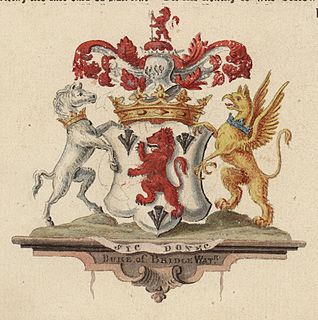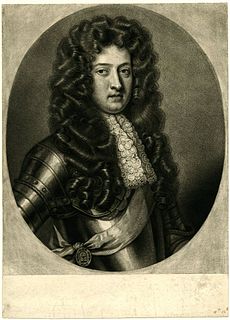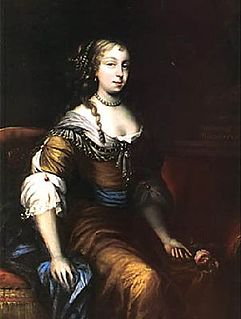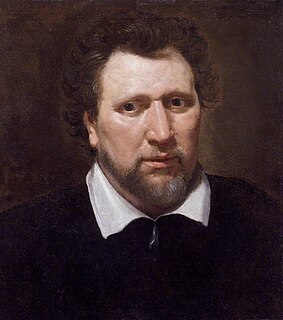
Earl of Bridgewater is a title that has been created twice in the Peerage of England, once for the Daubeny family (1538) and once for the Egerton family (1617). From 1720 to 1803, the Earls of Bridgewater also held the title of Duke of Bridgewater. The 3rd Duke of Bridgewater is famously known as the "Canal Duke", for his creation of a series of canals in North West England.

John Egerton, 3rd Earl of Bridgewater KB PC was a British nobleman from the Egerton family.

Scroop Egerton, 1st Duke of Bridgewater, known as Viscount Brackley from 1687 to 1701 and as the Earl of Bridgewater from 1701 to 1720, was a British peer, courtier and pioneering landowner.

The Nine Muses, Or, Poems Written by Nine severall Ladies Upon the death of the late Famous John Dryden, Esq. was an elegiac volume of poetry published pseudonymously. The contributors were English women writers, each of whom signed their poems with the names of Muses. The collection was edited by Delarivier Manley and includes pieces by Susanna Centlivre, Sarah Fyge Egerton, Mary Pix ("Clio"), Catherine Trotter ("Calliope"), and Sarah Piers ("Urania"). The poet writing as "Polimnia" has not been identified; her initials are "Mrs. D. E."
Sarah, Lady Piers was an English literary patron, political commentator, and a poet.

Elizabeth Cary, Viscountess Falkland, was an English poet, dramatist, translator, and historian. She is the first woman known to have written and published an original play in English. From an early age, she was recognized as an accomplished scholar by contemporary writers.
Alicia D'Anvers [née Clarke] was an English poet.
Mary Oxlie would seem to have been an early 17th-century Scottish or Northumbrian coterie poet, though little is known of her beyond one attribution.

An Collins is an English poet, and the otherwise unknown author credited with the authorship of Divine Songs and Meditacions, a collection of poems and prose meditations published in 1653.

John Egerton, 1st Earl of Bridgewater KB, PC was an English peer and politician from the Egerton family.

Elizabeth Wilmot, Countess of Rochester was an English heiress and the wife of John Wilmot, 2nd Earl of Rochester, the "libertine". She was born Elizabeth Malet, the daughter of John Malet, of Enmore Manor, and Unton Hawley, daughter of Francis Hawley, 1st Baron Hawley.
Elizabeth Thomas was a British poet.
Anne Wharton, née Lee was an English poet and verse dramatist. Little of her work was published in her lifetime, but some 45 works have been ascribed to her.

John William Egerton, 7th Earl of Bridgewater FRS, known as John Egerton until 1803, was a British cavalry officer, and Tory politician who sat in the House of Commons from 1777 to 1803 when he succeeded to the peerage as Earl of Bridgewater. He was from the Egerton family.
Jane Egerton, Countess of Bridgewater, was the second wife of John Egerton, 3rd Earl of Bridgewater. She was a daughter of Charles Paulet, 1st Duke of Bolton, by his second wife Mary Scrope.














